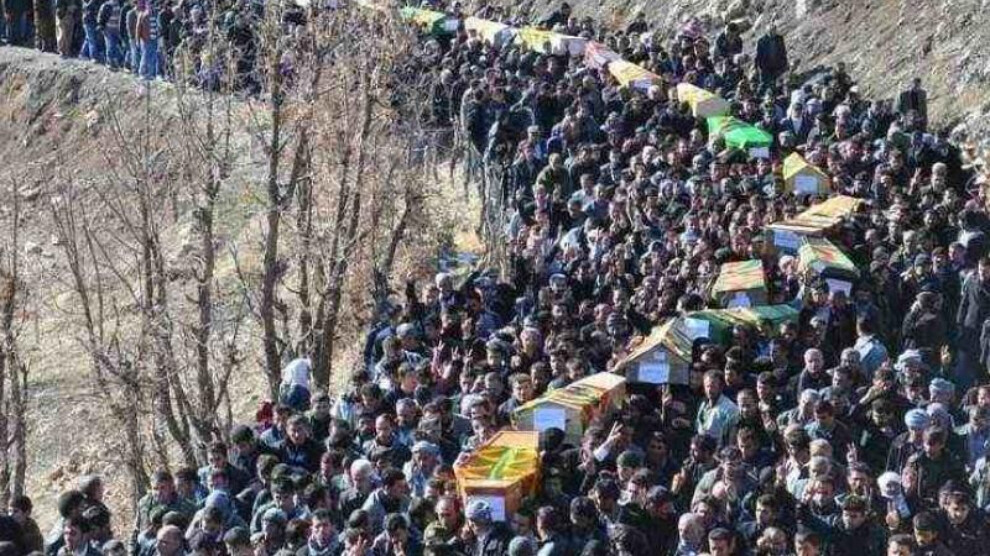People of Roboski demand justice for 12 years
Human Rights Association (IHD) Central Executive Board member Nuray Çevirmen says that the failure to respond to calls for confrontation and justice after the Roboski Massacre, which took place 12 years ago, paved the way for other massacres.

SERPİL SAVUMLU
News Center- On December 28, 2011, Turkey witnessed one of the most painful massacres in its history. 34 people, including 18 teenagers from the Encü family, were killed in an airstrike launched by the Turkish Air Force in the Roboski (Ortasu) village of Şırnak’s Uludere district.
Dead bodies were taken from the scene by villagers
For a while, the massacre was hidden from the public; the mainstream media did not report anything about the massacre. The people learned of the massacre from opposition media outlets. The General Staff of the Turkish Armed Forces released a statement on the massacre one day later. The villagers took the dead bodies from the scene by using mules.
After the massacre, many commissions went to the scene to investigate the massacre. A commission of the Human Rights Association (IHD) was one of the delegations. Then, the IHD released a report on the massacre. The report said that the killed people were the smugglers. “There was no attempt by the official institutions to take dead or injured people, therefore; villagers arrived late in the incident scene with their own means. As a result, some injured people lost their lives due to blood loss and freezing. Soldiers left the incident scene when villagers went there to take the corpses. The corpses were brought to the Gülyazı village by the villagers with their own means,” the report said.
Legal procedures
On June 11, 2013, the Diyarbakır Prosecutor's Office found negligence rather than deliberate intent by the military staff and declared a lack of jurisdiction and transferred the investigation to the military prosecutor. However, the military prosecutor decided not to prosecute the case further ın January 2014 on the ground that the authorized soldiers had made an inevitable mistake regarding terrorist activity and ordered the bombardment. In July 2014, the families of victims applied to the Turkish Constitutional Court. On February 24, 2015, the Turkish Constitutional Court rejected the applications. After the decision of non-jurisdiction, the families of 40 citizens, including the injured ones, applied to the European Court of Human Rights. The court issued an inadmissibility decision regarding the application concerning the Roboski massacre on the grounds that domestic remedies had not been exhausted. After this decision, the families applied to the Turkish Constitutional Court again on April 9, 2021.
The names of the killed people are: Karker Encü (16), Seyithan Encü (21), Nadir Alma (26), Mehmet Ali Tosun (24), Şervan Encü (19), Nevzat Encü (19), Osman Kaplan (31), Özcan Uysal (18), Selim Encü (39), Vedat Encü (18), Muhammet Encü (13), Mahsum Encü (17), Bilal Encü (16), Erkan Encü (13), Hüsnü Encü (20), Savaş Encü (14), Cihan Encü (19), Cemal Encü (17), Serhat Encü (15), Hamza Encü (21), Celal Encü (15), Şerafettin Encü (18), Selam Encü (22), Bedran Encü (13), Fadıl Encü (20), Hüseyin Encü (20), Aslan Encü (17), Şıvan Encü (13), Orhan Encü (21), Zeydan Encü (25), Salih Encü (16), Yüksel Ürek (21), Adem Ant (19) and Salih Ürek (18).
They were all involved in smuggling gasoline and cigarettes due to economic reasons; to support their families or cover school expenses.
On the 12th anniversary of the Roboski Massacre, NuJINHA spoke to Nuray Çevirmen, member of the Human Rights Association (IHD) Central Executive Board. “The Roboski Massacre is actually one of the dozens of massacres that took place in this geography,” she said, highlighting the policy of immunity. “Discriminatory policies against the Kurdish people cause impunity and injustice. Everyone knew that the route used by people to cross the border. Despite that, the massacre took place in Roboski. Although our commission revealed negligence, the massacre was buried in the corridors of Ankara.”
Nuray Çevirmen thinks that the massacres that took place before the Roboski Massacre paved the way for the Roboski Massacre. “The failure to respond to calls for confrontation and justice for the Roboski Massacre paved the way for other massacres. If the perpetrators of a massacre had not gone unpunished, other massacres would not have taken place.”
Although 12 years have passed since the massacre, the people of Roboski still demand justice for their loved-ones. For 12 years, the people of Roboski have been mourning for their loved-ones.
